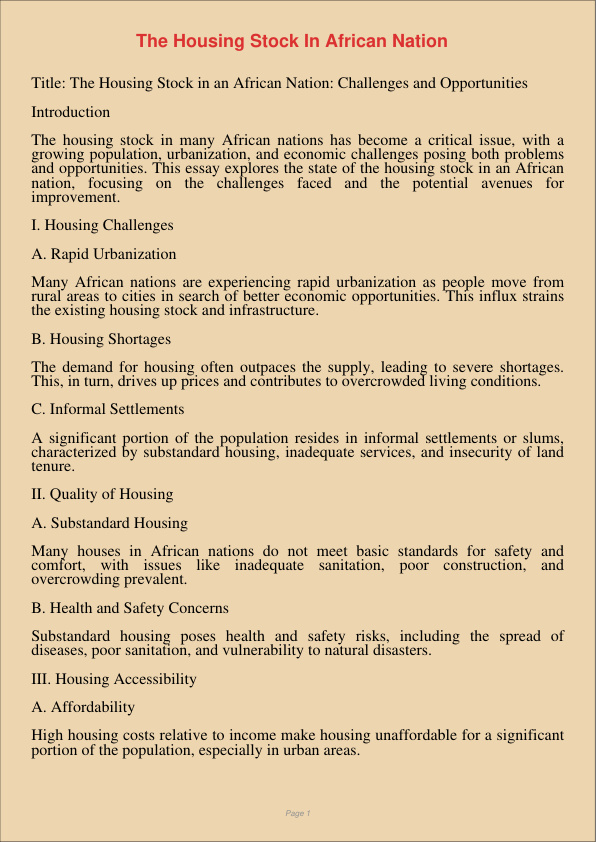The Housing Stock In African Nation
Jan 12, 2024
housing stock
african nation
Law
Human Resources

Title: The Housing Stock in an African Nation: Challenges and Opportunities
Introduction
The housing stock in many African nations has become a critical issue, with a growing population, urbanization, and economic challenges posing both problems and opportunities. This essay explores the state of the housing stock in an African nation, focusing on the challenges faced and the potential avenues for improvement.
I. Housing Challenges
A. Rapid Urbanization
Many African nations are experiencing rapid urbanization as people move from rural areas to cities in search of better economic opportunities. This influx strains the existing housing stock and infrastructure.
B. Housing Shortages
The demand for housing often outpaces the supply, leading to severe shortages. This, in turn, drives up prices and contributes to overcrowded living conditions.
C. Informal Settlements
A significant portion of the population resides in informal settlements or slums, characterized by substandard housing, inadequate services, and insecurity of land tenure.
II. Quality of Housing
A. Substandard Housing
Many houses in African nations do not meet basic standards for safety and comfort, with issues like inadequate sanitation, poor construction, and overcrowding prevalent.
B. Health and Safety Concerns
Substandard housing poses health and safety risks, including the spread of diseases, poor sanitation, and vulnerability to natural disasters.
III. Housing Accessibility
A. Affordability
High housing costs relative to income make housing unaffordable for a significant portion of the population, especially in urban areas.
B. Limited Access to Financing
Access to mortgage financing is limited for many citizens, making homeownership a distant dream for the majority.
IV. Government Initiatives
A. Housing Policies
Many African governments have initiated housing policies and programs to address housing challenges. These include affordable housing schemes, slum upgrading, and tenure security initiatives.
B. Partnerships and Investment
Collaboration with international organizations and investment in housing infrastructure can significantly improve the housing stock.
V. Community and NGO Involvement
A. Grassroots Initiatives
Local communities and non-governmental organizations play a vital role in improving housing conditions. They engage in activities such as upgrading informal settlements, promoting sanitation, and advocating for better housing policies.
B. Empowerment and Education
Promoting housing and financial literacy among citizens can empower individuals to make informed choices about housing and investment.
Conclusion
The housing stock in African nations faces significant challenges, including rapid urbanization, housing shortages, substandard living conditions, and limited affordability. However, various opportunities exist for improvement, including government initiatives, partnerships, community involvement, and education. Ensuring adequate and affordable housing is essential for both the well-being of citizens and the sustainable development of African nations. Addressing these challenges and seizing opportunities in the housing sector can pave the way for a better quality of life for millions of people in the region.